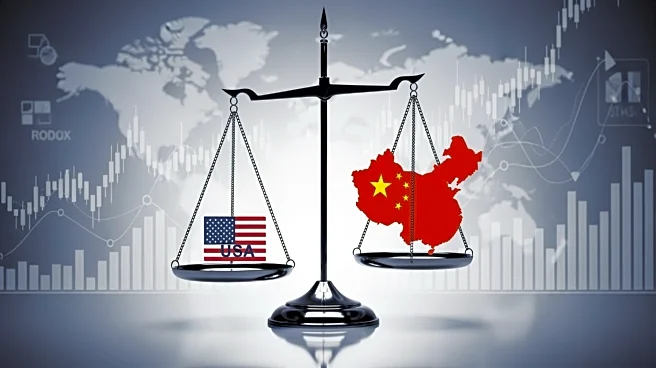What's Happening?
Federal Reserve Governor Stephen Miran has emphasized the increased downside risks to the U.S. economic outlook due to renewed trade tensions with China. Speaking at the CNBC 'Invest in America Forum'
in Washington, Miran noted that China's recent decision to restrict exports of rare earth minerals, essential for high-tech manufacturing, has introduced new challenges. In response, President Trump has threatened to raise tariffs on Chinese imports to 100%, potentially reigniting a trade war that had previously been mitigated through negotiations. Treasury Secretary Scott Bessent confirmed ongoing talks between the U.S. and China. The Federal Reserve had already cut interest rates by a quarter percentage point last month and is expected to do so again at its upcoming meeting, aiming to adjust its policy rate to the 3.75%-4.00% range.
Why It's Important?
The renewed trade tensions between the U.S. and China could have significant implications for global trade and economic stability. The restriction on rare earth minerals by China affects industries reliant on high-tech consumer and defense products, potentially disrupting supply chains and increasing production costs. The Federal Reserve's decision to cut interest rates further reflects the urgency to mitigate these risks and stabilize the economy. Lower interest rates could stimulate economic activity by making borrowing cheaper, but they also signal concerns about economic growth. Stakeholders in manufacturing and technology sectors may face increased uncertainty, while policymakers must navigate the delicate balance between trade negotiations and economic policy adjustments.
What's Next?
The Federal Reserve is expected to continue its monetary policy adjustments, with another rate cut anticipated at its October 28-29 meeting. This move aims to achieve a more neutral policy stance amidst the evolving trade landscape. The ongoing negotiations between the U.S. and China will be crucial in determining the future of trade relations and economic impacts. Businesses and investors will closely monitor these developments, as any escalation in tariffs or trade barriers could lead to further economic disruptions. The situation demands careful diplomatic and economic strategies to prevent a full-scale trade conflict.
Beyond the Headlines
The restriction of rare earth minerals by China highlights the strategic importance of these resources in global manufacturing and defense industries. This development underscores the geopolitical dimensions of trade policies, where resource control can be leveraged as a tool in international negotiations. The U.S. may need to explore alternative sources or invest in domestic production capabilities to reduce dependency on foreign supplies. Additionally, the situation raises ethical considerations regarding the environmental impact of rare earth mining and the need for sustainable practices.









